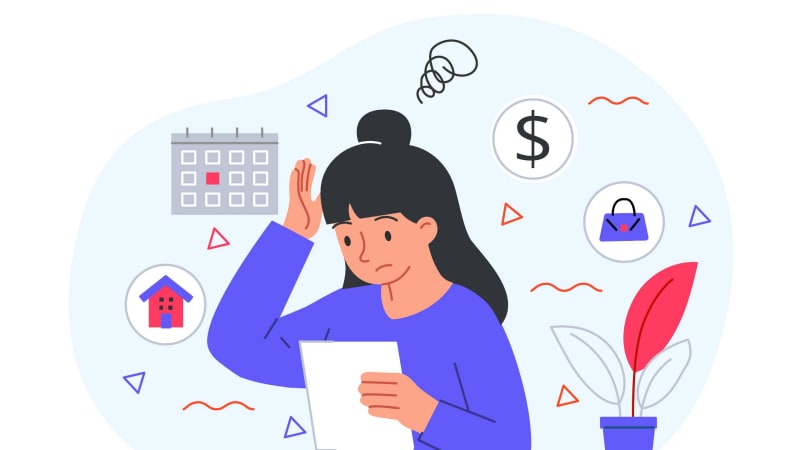How to build credit when unemployed

Quick insights
- Your employment status isn’t reported to credit bureaus, so being unemployed won’t directly lower your credit score, but the indirect effects like (missed payments or high credit-use) can.
- Even while unemployed, you can build and protect your credit by continuing to use a credit card responsibly (without maxing it out) and making required payments on time.
- Monitoring your credit with free tools and adopting a tighter budget (i.e. reviewing subscriptions/services, lowering discretionary spending) are some key strategies to prevent credit score dips when income is interrupted.
Being unemployed can be incredibly stressful, to say the least. Whether you chose to leave your employer or not, you're facing a sudden shift in your life—no longer receiving a steady and specific source of income. If you've been laid off, you may be eligible for unemployment compensation. While this can temporarily help make ends meet, you might be wondering—will being unemployed affect my credit score?
Does unemployment affect my credit score?
Credit reports do not show information on your employment status. Therefore, being unemployed will not directly impact your score, but your circumstances could indirectly affect your credit. In this article, you will learn:
- How to establish credit without a job
- How to build and retain credit when unemployed
- How to manage your debt while unemployed
How to establish credit without a job
Income is not a factor when it comes to your credit score. However, income can help you pay your bills, which contributes towards your payment history. So, you can still establish credit without a job. If you're able to make your bills on time, you'll be contributing towards your payment history—a highly weighted factor that goes into generating your credit score.
Without a steady source of income, it's possible that you could be relying more on your credit card, and at some point that reliance could tip the balance of credit utilization and begin to negatively affect your credit score. Credit utilization is how much of your credit you use. A general rule of thumb is to keep this at about 30%. For example, if you have a credit limit of $10,000, try to only use $3,000 of that total. Keep this ratio low if possible by cutting unnecessary expenditures and adding new streams of revenue.
How to build and retain credit when unemployed
Being unemployed could affect your credit utilization ratio and other factors that contribute to your score, so if you aren't already doing so, it's wise to institute a personal budget that shines a light on discretionary spending and can help you build and maintain credit. Some questions to ask yourself may include:
- Can I freeze any subscriptions (or fully unsubscribe from services) for the time being?
- Can I cut costs by making more meals at home?
- Can I pay for the same products using a coupon or at a discount store?
Continue using your credit card
Contrary to what you might think, it's also important to continue using your credit card—don't quit using it cold turkey. Be sure you don't max out your card and make sure you can still make monthly payments. This is where an emergency savings account can be helpful, enabling you to pay for necessities like rent, credit cards and auto payments. Just be vigilant about your total savings and determine in advance how much you can afford to spend. The goal is not to liquidate your entire savings but to tap into your savings account as a temporary source of cash.
As much as possible, continue to make your necessary monthly payments. This is essential, because if you begin missing payments, your credit score could decrease even more than if you simply increased your credit utilization during this time.
Leverage free tools and resources
A period of unemployment can be an overwhelming time, and you may not know where to start when it comes to managing your finances. That's where resources like Chase Credit Journey® can help. With this free online tool, you can receive a personalized action plan provided by Experian™ to improve your credit score, as well as monitor your credit and enroll in identity monitoring services.
Keeping an eye on your score over time is a great way to help build your credit, even while unemployed. Credit monitoring is a healthy habit that can put you in a better position to understand the entire landscape of credit, including your credit score.
How to manage your debt when unemployed
If you're already in large amount of debt when you become unemployed, you may need to get some additional help—and there is no shame in asking for help! Consider working with a reputable credit counseling company or create a debt management plan (either on your own or with the expertise of a trustworthy professional).
You may want to start looking for ways to add streams of revenue. If possible, look for a job that could help provide you with security, benefits and a regular income. If this isn't feasible, you may want to consider taking on part-time work to help offset some of your debts.
Finally, talk with your credit card issuer or lender to see about what options may be available to you. For example, you could request a balance transfer so that you can help offset some of your costs towards interest. Working with your lender to make these financial decisions can help put you in a position to better manage your debt, even while you're unemployed.
In summary
Whatever the circumstances are, building your credit is essential for unlocking opportunities. This is especially true when you are unemployed. It can be challenging to embrace positivity when the chips are down—finding small ways to adjust spending and maintain the necessary flow of payments can make a lasting impact on your credit score. When possible, finding small ways to adjust can help to positively affect your credit score and overall financial health.



